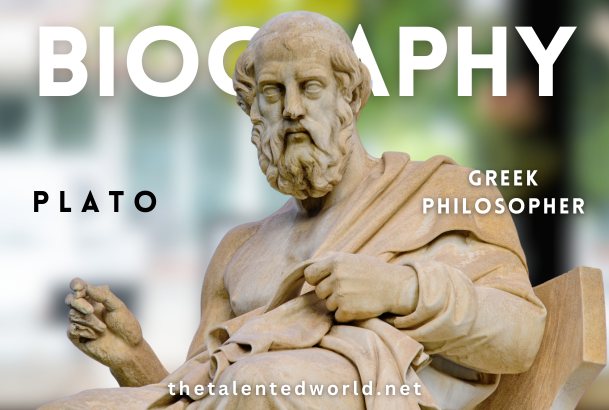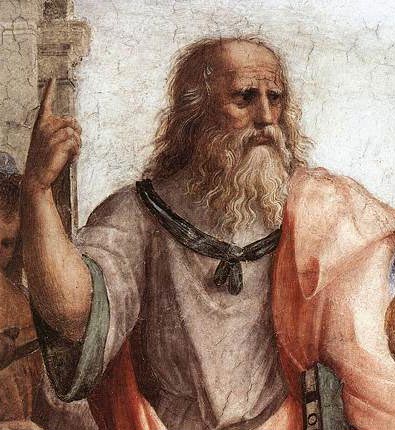
Biography
Plato originally named Aristocles was a famous ancient Greek philosopher. He was born in 427 BC in Athens or Aegina and died in 348 BC. He belongs to an aristocratic family. His father’s name is Ariston and his mother is Perictione. Plato has many siblings, including 2 brothers Glaucon and Adeimantus, and a sister named Potone.
Despite his birth name being Aristocles, he is commonly known as Plato, derived from the Greek word “platos,” meaning “broad.”
Plato is also the founder of the Academy in Athens. His notable students are Aristotle (who also established his school with the name of Lyceum). He traveled across various regions for his philosophy journey, including Italy, Sicily, Egypt, and Cyrene.
Plato was also involved in the political affairs of his time, especially in Syracuse, where he attempted to influence governance and educate rulers. Plato’s death is surrounded by various traditions. One said that he passed away peacefully in his bed while a young girl played the flute and another said that he died at a wedding feast.
Pluto’s legacy as a foundational figure in Western philosophy influences philosophical thought and discourse to this day.
Quick Facts about Plato Biography
| Aspect | Quick Fact |
|---|---|
| Birthdate | Around 428/427 or 424/423 BC |
| Birthplace | Athens or Aegina (contested) |
| Given Name | Aristocles |
| Nickname | Plato (derived from wrestling coach) |
| Family | Aristocratic and influential |
| Education | Wore earrings and finger rings in my youth |
| Adornments | Founder of the Academy, a major figure in Western philosophy |
| Contributions | Founder of the Academy, major figure in Western philosophy |
| Theory of Forms | Introduced in middle dialogues, central to his philosophy |
| Legacy | Influential in philosophy, literature, and political thought |
| Death | Circumstances disputed, multiple accounts exist |
| Works | Dialogues exploring metaphysics, ethics, politics, etc. |
| Unwritten Doctrines | Alleged oral teachings, hinted at in Aristotle’s writings |
| Contemporary Significance | Influential in education, political theory, and philosophy |

Pluto Works
| Title | Description |
|---|---|
| Euthyphro | Dialogue discussing the nature of piety and justice |
| Apology | Account of Socrates’ defense at his trial |
| Crito | Dialogue on justice and obedience to the law |
| Phaedo | Account of Socrates’ final moments and his death |
| Meno | Exploration of the nature of virtue and knowledge |
| Protagoras | Examination of the nature of virtue and relativism |
| Gorgias | Discussion on rhetoric and its ethical implications |
| Symposium | Exploration of love and its various forms |
| Phaedrus | Examination of the nature of love and rhetoric |
| Parmenides | Dialogue exploring the nature of reality |
| Theaetetus | Discussion of knowledge and perception |
| Republic | Major work discussing justice, the ideal state, and the nature of the soul |
| Timaeus | Dialogue on cosmology and the creation of the universe |
| Laws | Dialogue on the nature of law and governance |
FAQs about Plato Biography
What is the full name of Plato?
The full name of Plato was Aristocles, though he is commonly known as Plato.
What is the profession of Plato?
Plato was an ancient Greek philosopher and the founder of the Platonic Academy in Athens.
What is the age of Plato?
Plato was born around 428/427 or 424/423 BC and died in 348 BC, making him approximately 80 years old at the time of his death.
What is the height of Plato?
There is no reliable historical information available regarding Plato’s height.
What is the weight of Plato?
There is no historical record of Plato’s weight.
Who is Plato’s wife?
Plato never married, and there is no known information about any romantic relationships he may have had.
Who are Plato’s parents?
Plato’s father was Ariston, and his mother was Perictione.
Who are Plato’s siblings?
Plato had two brothers named Glaucon and Adeimantus, a sister named Potone, and a half-brother named Antiphon.
What is the net worth of Plato?
It is impossible to determine Plato’s net worth as he lived in ancient times, and records of personal wealth from that era are scarce.
What is the education of Plato?
Plato received a comprehensive education in Athens, likely including instruction in philosophy, mathematics, rhetoric, and other subjects.
What are the major awards Plato received?
There is no record of specific awards or honors bestowed upon Plato during his lifetime.





